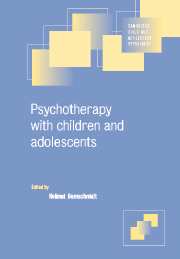Book contents
- Frontmatter
- Contents
- List of contributors
- Preface
- Part I Principles of psychotherapy with children, adolescents and families
- Part II Psychotherapeutic methods and settings
- Part III The practice of psychotherapy for specific disorders in childhood and adolescence
- Part IV The practice of psychotherapy in various settings
- 32 Inpatient psychotherapy
- 33 Day-patient psychotherapy
- 34 Home treatment
- Index
33 - Day-patient psychotherapy
- Frontmatter
- Contents
- List of contributors
- Preface
- Part I Principles of psychotherapy with children, adolescents and families
- Part II Psychotherapeutic methods and settings
- Part III The practice of psychotherapy for specific disorders in childhood and adolescence
- Part IV The practice of psychotherapy in various settings
- 32 Inpatient psychotherapy
- 33 Day-patient psychotherapy
- 34 Home treatment
- Index
Summary
The term ‘partial hospitalization’ is used to describe treatment of children and adolescents which is undertaken only during the day (‘day-patient treatment’) or night (‘night-patient treatment’). Although night treatment is not particularly relevant in this age group, day-patient treatment has become increasingly important (Dopfner, 1993a). Day-patient treatment offers the many advantages of inpatient treatment, whilst allowing patients to spend the late afternoons, nights, and weekends in their usual home environment.
Indications and preconditions for day-patient treatment
Indications
The following indications for day-patient treatment have been suggested (Remschmidt, 1992; Remschmidt and Schmidt, 1988).
Avoidance of hospitalization
Day-patient treatment may be appropriate when outpatient treatment is impossible, has been only partially or unsuccessful, despite inpatient treatment being deemed unnecessary. This group may include children with emotional disturbance, hyperkinetic disorder, minimal brain dysfunction and severe specific learning disorders (such as dyslexia and dyscalculia). Day-patient treatment is particularly recommended when children are at risk of developmental disturbance or difficulties at school or work where the family is unable to provide sufficient support.
Curtailment of inpatient treatment
Day-patient treatment should be considered as a secondary treatment step in children who initially required inpatient treatment. Earlier discharge is often possible provided subsequent day-patient facilities are available, e.g. in psychosis, organic behavioural disorder due to brain dysfunction, anorexia nervosa. Day-patient treatment may also be appropriate in the process of gradual reintegration into the family and school or work.
Refusal of inpatient treatment
In some cases, inpatient treatment may be considered advisable, but is refused by the patient or his parents. In such cases day-patient treatment may be an acceptable option.
- Type
- Chapter
- Information
- Psychotherapy with Children and Adolescents , pp. 552 - 567Publisher: Cambridge University PressPrint publication year: 2001



